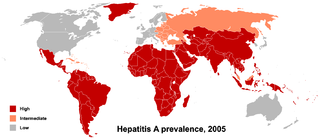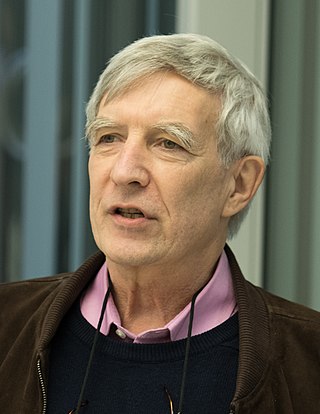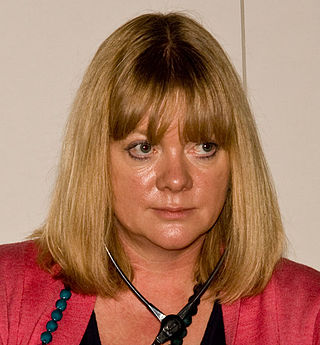Related Research Articles

Anthropology is the scientific study of humanity, concerned with human behavior, human biology, cultures, societies, and linguistics, in both the present and past, including past human species. Social anthropology studies patterns of behavior, while cultural anthropology studies cultural meaning, including norms and values. A portmanteau term sociocultural anthropology is commonly used today. Linguistic anthropology studies how language influences social life. Biological or physical anthropology studies the biological development of humans.

Cultural anthropology is a branch of anthropology focused on the study of cultural variation among humans. It is in contrast to social anthropology, which perceives cultural variation as a subset of a posited anthropological constant. The term sociocultural anthropology includes both cultural and social anthropology traditions.
Medical anthropology studies "human health and disease, health care systems, and biocultural adaptation". It views humans from multidimensional and ecological perspectives. It is one of the most highly developed areas of anthropology and applied anthropology, and is a subfield of social and cultural anthropology that examines the ways in which culture and society are organized around or influenced by issues of health, health care and related issues.

Health geography is the application of geographical information, perspectives, and methods to the study of health, disease, and health care. Medical geography, a sub-discipline of or sister field of health geography, focuses on understanding spatial patterns of health and disease as related to the natural and social environment. Conventionally, there are two primary areas of research within medical geography: the first deals with the spatial distribution and determinants of morbidity and mortality, while the second deals with health planning, help-seeking behavior, and the provision of health services.
Merrill Singer is a medical anthropologist and professor emeritus in Anthropology at the University of Connecticut and in Community Medicine at the University of Connecticut Health Center. He is best known for his research on substance abuse, HIV/AIDS, syndemics, health disparities, and minority health.
The social determinants of health are the economic and social conditions that influence individual and group differences in health status. They are the health promoting factors found in one's living and working conditions, rather than individual risk factors that influence the risk or vulnerability for a disease or injury. The distribution of social determinants is often shaped by public policies that reflect prevailing political ideologies of the area.
Ethnoecology is the scientific study of how different groups of people living in different locations understand the ecosystems around them, and their relationships with surrounding environments.
Ronald Frankenberg was a British anthropologist and sociologist, known for his study of conflict and decision-making in a Welsh village. He also contributed to the development of medical anthropology.

Richard Gerald Wilkinson is a British social epidemiologist, author, advocate, and left-wing political activist. He is Professor Emeritus of social epidemiology at the University of Nottingham, having retired in 2008. He is also Honorary Professor of Epidemiology and Public Health at University College London and Visiting Professor at University of York. In 2009, Richard co-founded The Equality Trust. Richard was awarded a 2013 Silver Rose Award from Solidar for championing equality and the 2014 Charles Cully Memorial Medal by the Irish Cancer Society.

Social medicine is an interdisciplinary field that focuses on the profound interplay between socio-economic factors and individual health outcomes. Rooted in the challenges of the Industrial Revolution, it seeks to:
- Understand how specific social, economic, and environmental conditions directly impact health, disease, and the delivery of medical care.
- Promote conditions and interventions that address these determinants, aiming for a healthier and more equitable society.
The Rudolf Virchow Awards are annual American awards in anthropology.
While epidemiology is "the study of the distribution and determinants of states of health in populations", social epidemiology is "that branch of epidemiology concerned with the way that social structures, institutions, and relationships influence health." This research includes "both specific features of, and pathways by which, societal conditions affect health".
Pamela Irene Erickson is a medical anthropologist. The holder of both a Dr.P.H and a PhD, she is Professor of Anthropology and Community Medicine at the University of Connecticut, Storrs. A former editor of the scholarly journal Medical Anthropology Quarterly, much of her own research has focused on reproductive health among Hispanic girls and young women. Prominent among the publications resulting from these investigations is her 1998 book, Latina Adolescent Childbearing in East Los Angeles. Erickson has also done fieldwork in Nepal, the Philippines, India, and Ecuador and this work is reflected in her 2008 textbook, Ethnomedicine. A Fellow of the American Anthropological Association and the Society for Applied Anthropology, Erickson has also served on the Governing Council of the Family and Reproductive Health Section of the American Public Health Association. Additionally, she is co-editor, with Merrill Singer of the book series Advances in Critical Medical Anthropology with Routledge.

Environmental social science is the broad, transdisciplinary study of interrelations between humans and the natural environment. Environmental social scientists work within and between the fields of anthropology, communication studies, economics, geography, history, political science, psychology, and sociology; and also in the interdisciplinary fields of environmental studies, human ecology and political ecology, social epidemiology, among others.
Environmental anthropology is a sub-discipline of anthropology that examines the complex relationships between humans and the environments which they inhabit. This takes many shapes and forms, whether it be examining the hunting/gathering patterns of humans tens of thousands of years ago, archaeological investigations of early agriculturalists and their impact on deforestation or soil erosion, or how modern human societies are adapting to climate change and other anthropogenic environmental issues. This sub-field of anthropology developed in the 1960s from cultural ecology as anthropologists borrowed methods and terminology from growing developments in ecology and applied then to understand human cultures.
The following outline is provided as an overview of and topical guide to social science:

Kate Elizabeth Pickett is a British epidemiologist and political activist who is Professor of Epidemiology in the Department of Health Sciences at the University of York, and was a National Institute for Health and Care Research Career Scientist from 2007 to 2012. She co-authored The Spirit Level: Why More Equal Societies Almost Always Do Better and is a co-founder of The Equality Trust. Pickett was awarded a 2013 Silver Rose Award from Solidar for championing equality and the 2014 Charles Cully Memorial Medal by the Irish Cancer Society.
The social determinants of health in poverty describe the factors that affect impoverished populations' health and health inequality. Inequalities in health stem from the conditions of people's lives, including living conditions, work environment, age, and other social factors, and how these affect people's ability to respond to illness. These conditions are also shaped by political, social, and economic structures. The majority of people around the globe do not meet their potential best health because of a "toxic combination of bad policies, economics, and politics". Daily living conditions work together with these structural drivers to result in the social determinants of health.

Critical realism is a philosophical approach to understanding science, and in particular social science, initially developed by Roy Bhaskar (1944–2014). It specifically opposes forms of empiricism and positivism by viewing science as concerned with identifying causal mechanisms. In the last decades of the twentieth century it also stood against various forms of postmodernism and poststructuralism by insisting on the reality of objective existence. In contrast to positivism's methodological foundation, and poststructuralism's epistemological foundation, critical realism insists that (social) science should be built from an explicit ontology. Critical realism is one of a range of types of philosophical realism, as well as forms of realism advocated within social science such as analytic realism and subtle realism.

Health politics or politics of health is an interdisciplinary field of study concerned with the analysis of social and political power over the health status of individuals.
References
- DRAFT ENTRY ENCYCLOPEDIA OF PUBLIC HEALTH (in press) Entry: Anthropology in Public Health Author: Kathleen M. MacQueen at Centers for Disease Control and Prevention
- Critical Studies in Medicine, Science and the Body (The research group that comprises the UCB side of Joint UCB/UCSF Ph.D. in Medical Anthropology) at UC Berkeley
- Merrill Singer and Hans Baer. Critical Medical Anthropology. Amityville, New York: Baywood Publishing Co., 1995.
- Hans Baer, Merrill Singer and Ida Susser. Medical Anthropology and the World System. Westport, CT: Merrill Singer, Ed. The Political Economy of AIDS. Amityville, New York: Baywood Publishing Co., 1998.
- Arachu Castro and Merrill Singer, Eds. Unhealthy Health Policy: A Critical Anthropological Examination. Walnut Creek, CA: Altamira Press, 2004.
- Merrill Singer. The Face of Social Suffering: Life History of a Street Drug Addict. Prospect Heights, IL: Waveland Press, 2006.
- Merrill Singer and Hans Baer, Eds. Killer Commodities: Public Health and the Corporate Production of Harm. Malden, MA: AltaMira/Rowman & Littlefield Publishers, Inc., 2008.
- Merrill Singer. Drugging the Poor: Legal and Illegal Drug Industries and the Structuring of Social Inequality. Prospect Heights, IL: Waveland Press, 2008.
- Merrill Singer. Introduction to Syndemics: A Critical Systems Approach to Public and Community Health. San Francisco, CA: Jossey-Bass, 2009.
- Hans Baer and Merrill Singer. Global Warming and the Political Ecology of Health: Emerging Crises and Systemic Solutions. Walnut Creek, CA: Left Coast Press, 2009.
- Merrill Singer and G. Derrick Hodge, Eds. The War Machine and Global Health. Malden, MA: AltaMira/Rowman & Littlefield Publishers, Inc., 2010.
- Merrill Singer. The Anthropology of Infectious Disease. Walnut Creek, CA: Left Coast Press, 2014.